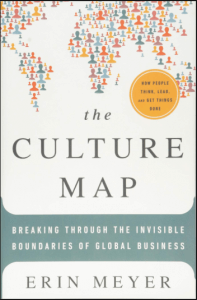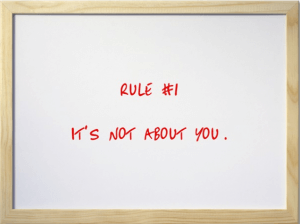How Does One's Cultural Background Influence How One Communicates With Others
How does Culture affect advice? Terminal fall I was privileged to travel for clients to far-away lands: South Africa, Arab republic of egypt, and the Philippines, with a travel layover in Paris thrown in every bit a bonus. As an infrequent international traveler (although that seems to exist irresolute), I had much to acquire almost airports, shots, Visas, jetlag, and… culture.
For years my go-to book for cultural advice has beenOsculation, Bow, or Shake Hands . It gives history, social etiquette communication, concern advice, and travel advice for 60+ countries. But I found information technology to exist inaccurate for several of my destinations last twelvemonth. For instance, the volume told me that in Arab republic of egypt, the left hand is unclean and should non be used for gestures. I found almost everyone using their left hand, and when I asked my host, he seemed shocked that it was even a "thing".
Soon after my return, my brother (who has traveled internationally quite a scrap with over a yr-and-a-half total spent out of country) gave me a copy of The Culture Map.  While this book does not give the same type of advice as KBoSH, it has changed the way I think, the way I teach, the way I communicate, and certainly the way I travel.
While this book does not give the same type of advice as KBoSH, it has changed the way I think, the way I teach, the way I communicate, and certainly the way I travel.
The author – who has traveled and lived internationally about of her life – compares 8 characteristics across cultures. She examines advice way, feedback, persuasion, leadership, decisions, trust, disagreeing, and timeliness. She then puts every major country on a scale, highlighting the differences with poignant and sometimes funny anecdotes of how lack of cultural awareness tin lead to results that are awkward on 1 extreme and devastating to business at the other.
How does civilization affect communication? Nosotros've long examined Culture in our workshops as information technology relates to skills. For instance, palatable eye contact is notably different in the South (2-3 seconds) than the North (almost none) versus Asia (none due to honor and deference) to the farthermost (ten seconds) in the Middle Due east. Gestures that are acceptable (or not) across the earth are always an interesting conversation (no, you're not #1, and information technology's not OK, and nosotros're not at peace). Nosotros make the betoken that Culture trumps any "rule" we can establish. I retrieve a French student in one of our workshops telling an American he was too loud. "If you talk like that in France, we would dismiss you lot equally existence impolite."
I had a blunt introduction to inter-cultural communication on my kickoff foray every bit an international speaker. I had been invited to give the keynote to a mostly-European audition in Germany. When I was done, I was surprised that no one came upwardly to speak to me. Usually as a speaker someone (or many someones) from the audience will come up to enquire a question, offer a related story, or perhaps just share appreciation for a job well done. This group just cleared out. The room was empty just minutes after I was done. When I wandered the halls after the talk, no one really even spoke to me. I felt terrible. I had tried to research and create content that was palatable for an international audience. It was clear to me I had failed. I went to my German host and apologized for missing the marker and asked straight if at that place was feedback that I could amend upon. "Oh, they loved you!" I explained that no 1 had said a word to me. She laughed. "That'due south simply Germans. If you had done a bad job, I'd have found out immediately. They're already wondering when yous'll come back."
I've always given a loose definition of Culture as "an unwritten set of rules accustomed by a group of people as law". Civilization could be defined by state, language, gender, age, professional group, family unit, job championship, and even the blazon of car you drive. Information technology's an amazing bailiwick with enough dash to keep any communicator on his toes.
Awareness of Culture tin can mean the difference between a friend and an enemy, condign a preferred vendor or being blacklisted, a marriage in the majestic courtroom or a pending war. Understanding nuances is vital. For instance, a nod and a "yeah" in Asia does not mean they agree. Many Asian cultures will but not deny a direct proposal regardless of their intent.
An interesting chapter in Ms. Meyer'due south volume is on feedback. If I give you an annual review that goes like this: "Nosotros love having you on board. You're a not bad asset to our team. But nosotros start our day at nine a.m. and I notation you're rarely at your desk-bound at that time. It'd probably be a good thought if you could go far prior to nine. Just we look forward to your talents on our team and what you can do for us in the coming yr." Enquire nearly whatsoever American what the bulletin ways and yous'll get a quick response: "Yous better go your tail to work on time!" But in some cultures of the world where indirect feedback is valued, your employee might resign to relieve you the embarrassment of having to fire them (non your intent). Direct feedback cultures might not even hear the correction, focusing on the forepart-and-center message that you love their work.
I had a "Duh!" moment from my time with an international client (earlier I read the volume). I was trying to get the pb presenter to make The Ask. In truthful Western fashion, I wanted the core message front and heart, repeated equally oftentimes as possible and catastrophe with a direct ask for the work (accompanied past eye contact and a genuine grin). What I got in practice was hints and hedges and hesitation. There was no direct ask. Later on reading the book, I realize I was request this person to deny his upbringing and contradict every bit of courtesy he had e'er been taught. An indirect culture does not inquire for what they want, at least not bluntly. They hint and use nuance to go the query on the tabular array. It'southward weak to Western eyes and ears; it's law in much of the Eastern earth.
How does culture touch advice? One matter that doesn't change and that I'm more and more adamant about is Dominion #1. No affair who you lot are dealing with, successful advice requires a willful commitment to the receiver's well-being. It's not about you. The Culture of the audience is a major consideration worth examining. Although my next international trip is not scheduled for a while, I'll be experiencing the grand cultures in the states with upcoming trips to Boston, Baltimore, Richmond, Kansas City, Lincoln, and Chicago. I'd beloved to hear nearly your experiences with dissimilar cultures.

Communication matters. What are you saying?
- How accept yous misread the Culture of your audience?
- What intercultural situations might give you cause for increased care when crafting your message?
- What assumptions are yous making as you craft your main message?
Learn more nearly our public and on-site communications and speaking workshops and training.
This article was published in the Apr Editionof our monthly speaking tips email newsletter, Advice Matters. Take speaking tips like these delivered directly to your inbox every month. Sign upwardly todayto receive our newsletter and receive our FREE eBook, "Twelve Tips that will Save You from Making a Bad Presentation." Y'all tin can unsubscribe at whatsoever time.
You have Successfully Subscribed!
How Does One's Cultural Background Influence How One Communicates With Others,
Source: https://www.millswyck.com/2019/04/03/how-does-culture-affect-communication/
Posted by: mitchellmovence.blogspot.com


0 Response to "How Does One's Cultural Background Influence How One Communicates With Others"
Post a Comment